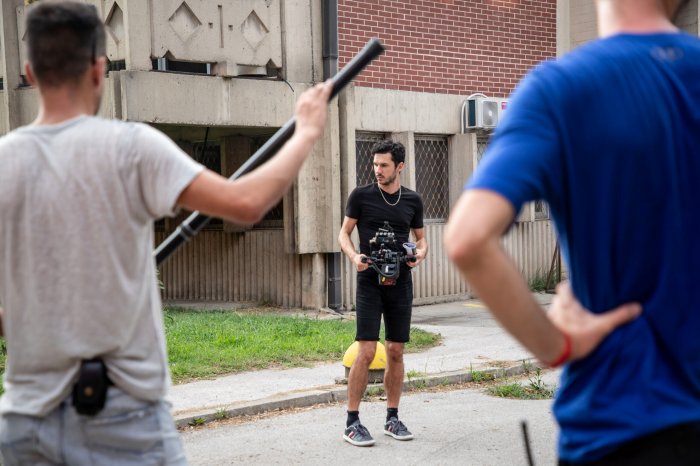In many parts of our world, standing up for even the most basic human rights can be a challenge of Herculean proportions. To go on the record is hard, but allowing yourself to be filmed? Words like brave and defiant don’t seem big enough. The documentaries in this year’s Human Rights Watch Film Festival capture personal dramas, depicting oppressed lives with conviction and a lot of artistry. The parts that are the most compelling, however, involve seeing and hearing people tell their own stories of struggle and sacrifice.
This year’s festival presents 16 documentaries and fiction films from 12 countries; 14 of them are making their New York premieres. While the festival has five themes — LGBT and migrants’ rights; health, development, and the environment; personal testimony and witnessing; reporting in crises; and women’s rights — what really emerges most is how the men and women in these films strive for and demand their dignity in the face of oppression. Some are willing to pay for this struggle with their own lives.
CALL ME KUCHU Directed by Katherine Fairfax Wright and Malika
Zouhali-Worrall
In English and Luganda with English subtitles
Closing Night Film, Jun. 28 at 7 p.m.
This documentary opens simply enough with an anniversary party for two gay men who have been together for nine years. It seems like a very simple backyard gathering, but we quickly learn that while simply living their lives, they are up against a government and a public that happily calls for their deaths, citing God’s law, just because they are kuchu, or queer. David Kato, “the first openly gay man in Uganda,” and his fellow LGBT activists are the party guests, and we learn about how they created SMUG (Sexual Minorities Uganda) and their battle with a national media that publishes their photos and calls for their hangings.
We also meet Giles Mahume, the publisher of Uganda’s homophobic newspaper Rolling Stone, who calmly explains how they use “disguise” — another word for entrapment — to learn who is gay and then expose them publicly. It’s very difficult to reconcile how someone can so calmly, dispassionately, and with a smile talk about deliberately ruining people’s lives. After a bomb blast, credited to Al Qaeda, the media blames Uganda’s gays. Kato worries that accusations of treason will endanger their lives.
We also meet two women, Naome and Stosh, who were forced to go into hiding after being outed. Friends and family don’t seem to understand why they are lesbians. A common question is, “Did you do this to earn money?”
The film culminates with a deadly legislative initiative against gays that for now, at least, remains stalled in the Ugandan legislature. The fact that the proposal is even in play is a tragedy, but it’s uplifting to see the sheer joy the activists share when the vote is postponed. As one of them says, “You stay with your strength.”
REPORTERO Directed by Bernardo Ruiz
In English and Spanish with English subtitles
Jun. 21 at 4 p.m.; Jun. 22 at 9:30 p.m.; Jun. 23 at
3:30 p.m.
Sensationalism has different translations. In a celebrity-obsessed America, it might be the latest Kardashian misstep, but south of the border, it is political corruption and narcotics trafficking that make headlines. The difference is critical. Here, we might get disgusted with non-news. In Mexico, journalists face death threats.
“Reportero” is the story of Zeta, a 32-year-old newspaper produced in Tijuana that covers the drug wars, corruption, and other social ills. “The only way to do investigative journalism [in Mexico] would be if Zeta was journalist-owned,” we learn. In Mexico, the press has been run by either the government or corporations. To maintain its independence, Zeta is printed in California
and imported into Mexico. In the 1980s, when the paper was founded, the government even controlled the supply of paper for publications.
“Reportero” benefits from a trove of Zeta’s own archival footage and photos, which feature its founder, Jesús Blancornelas, as well as his editors, many of whom lost their lives covering the drug cartels. Reporter Sergio Haro says that some stories were so dangerous, “It was like holding a grenade.” Sometimes, no individual bylines are given, to protect the writers. Writing the stories that other media outlets are afraid to cover comes with a price. Some of the editors’ lives become a crowd of bodyguards and bullet-resistant cars. But the truth is that “you cannot interview someone if you bring armed guards with you. You cannot run after a politician if you're wearing a bulletproof vest.”
“Reportero” shows us a journalism most American readers could not possibly recognize
SILENCED VOICES
Directed by Beate Arnestad
In English, Swedish, and
Tamil with English subtitles
Jun. 25 at 9:15 p.m.; Jun. 26
at 4 p.m.; Jun. 27 at 7 p.m.
When 300 people are killed in one day, it usually makes news worldwide. And yet, in Sri Lanka, when an estimated 390,000 Tamil minorities suddenly disappeared, how did something that big escape critical attention? “Silenced Voices” introduces us to several Sri Lankan journalists living in exile because they have persevered to tell the truth behind their government’s crushing of the Tamils and a 28-year civil war. International observers were ordered out, and film crews and cameras were forbidden.
“I believe journalists can save the world. Why else are we here?” says Sonali Samarasinghe, the widow of Lasantha Wickrematunge, a journalist slain for opposing the Sri Lankan government.
While admitting nothing, even a government official admits on TV, “If you are not with us, you are against us.” And, journalists who oppose government policies or question why hundreds of thousands of minorities vanished also disappear. It is easy for people in the West to take freedom of the press for granted. The Sri Lankans we meet are safe in places like Berlin, Oslo, and New York, but they aren’t happy. They would rather be home.
Thanks to technology, these journalists are able to view images and videos of executions and abuses, taken on smart phones and smuggled out of the country, hidden in the cloud computing that is email. “Silenced Voices” presents some of the most difficult imagery I’ve seen in my many years of reviewing this festival’s offerings. The journalists examine horrible scenes of executions and corpses and are able to demonstrate just how and why the nation’s military is pulling the trigger.
LITTLE HEAVEN
Directed by Lieven Corthouts
In Amharic with English subtitles
Jun. 25 at 4 p.m.; Jun. 26 at 6:30
p.m.; Jun. 27 at 9 p.m.
In many underdeveloped countries, orphans are not kids without parents — they are children institutionalized when parents or family cannot or will not provide care. In Ethiopia’s “Little Heaven,” we meet Lydia, who is told on her 13th birthday that she has HIV and is going to another orphanage. The woman who delivers the news seems very kind and clearly feels horrible about this dreadful birthday greeting.
We follow Lydia through her first year at Little Heaven orphanage. She lives two lives — one filled with friends and schoolwork, the other taken up with doctor’s visits and medications. She was dealt an unfair hand at birth, and now she’s been set aside by her family. She oscillates between a mantra of “I want to be happy every day” and a despairing question — “What does my future hold?” Lieven Corthouts highlights Lydia’s isolation by using long shots, showing her split off from the other children. We also see her vulnerability in extreme close ups. Her face, tears rolling down her cheeks, fills the screen when she is told she has HIV. During a visit to the doctor, close ups present just her face while the doctor talks about her condition.
It is the unscripted moments here that paint the most evocative pictures. A younger girl arranges her teddy bear next to a portrait of Jesus. Another girl says nothing makes her happy — “I just want to sit or sleep.” Lydia says it best, though: “Having HIV is like having someone live in your body without paying rent.”
INVISIBLE WAR Directed by Kirby Dick
Jun. 18 at 8:45 p.m.; Jun. 20 at 6:30 p.m.
“Invisible War” chronicles a long history of sexual assault within the US military against its own ranks. A “zero tolerance” policy toward the abuses seems to result in almost no investigations or arrests. The amazing thing about this documentary is that all the statistics come from government sources, and almost everyone we see on camera is currently or has been in the military. “Invisible War” has a June 22 general release date. Look for a full review by Steve Erickson in our Jun. 20-Jul. 3 issue.
HUMAN RIGHTS WATCH FILM FESTIVAL | Co-presented by the Film Society of Lincoln Center | Walter Reade Theatre | 165 W. 65th St. | Jun. 14-28 |Full information, tickets at ff.hrw.org




































